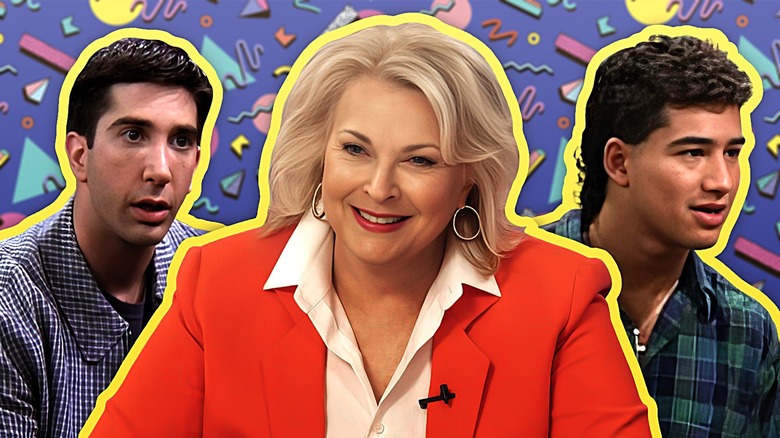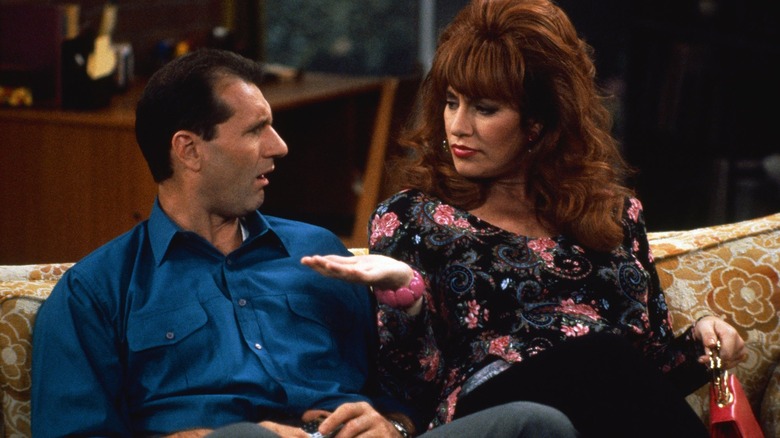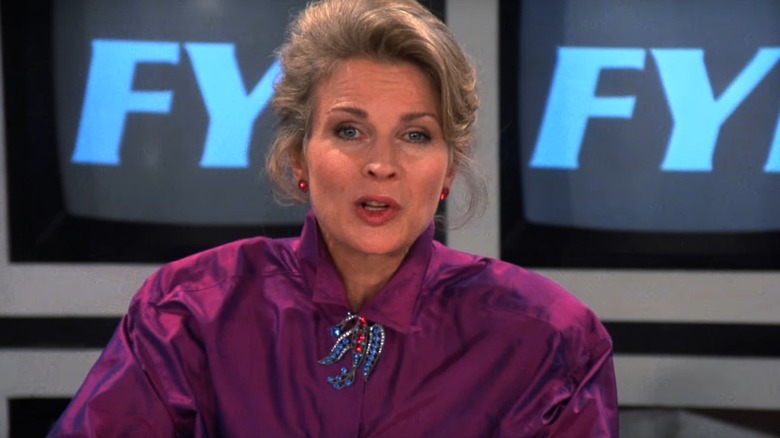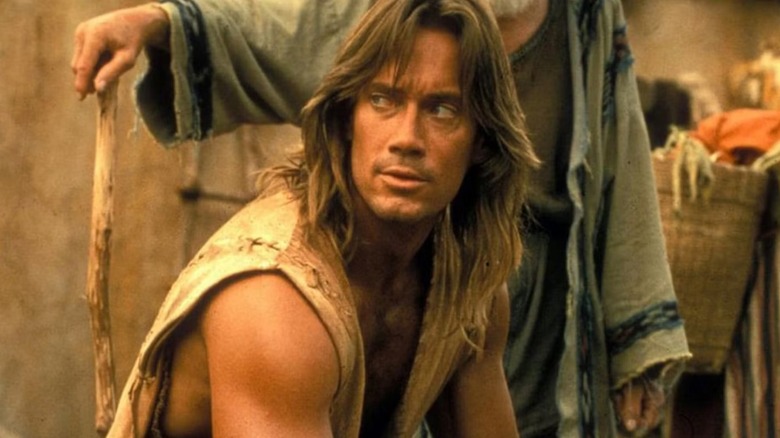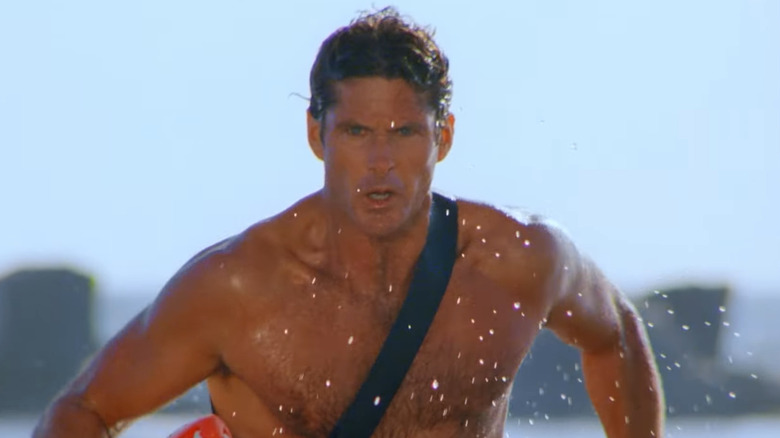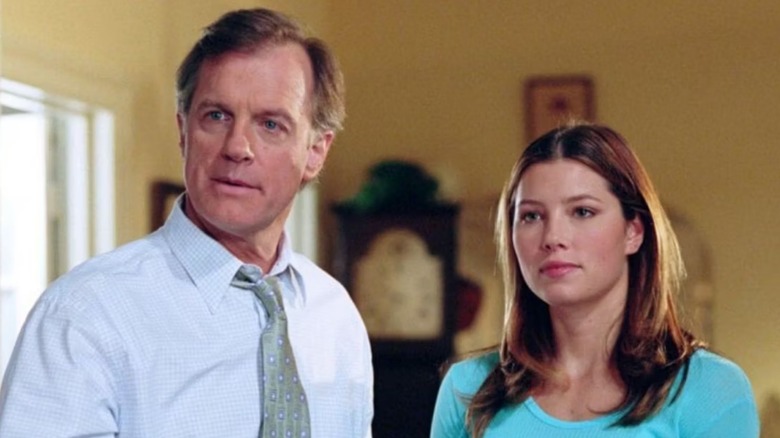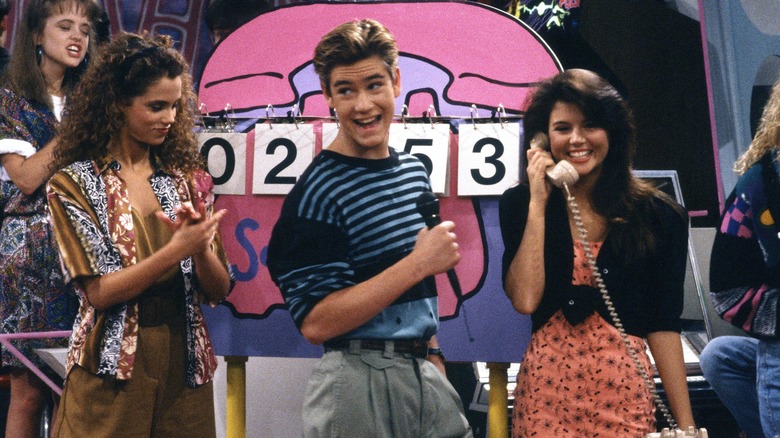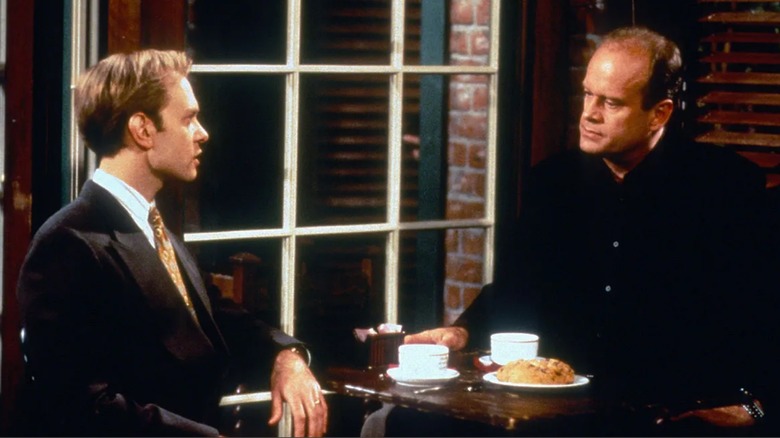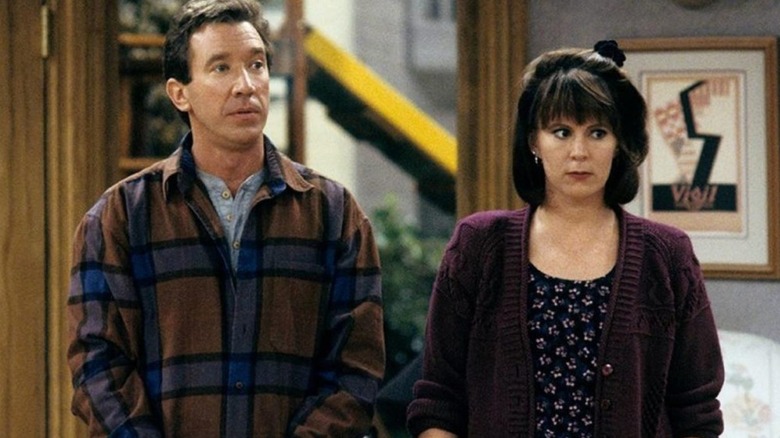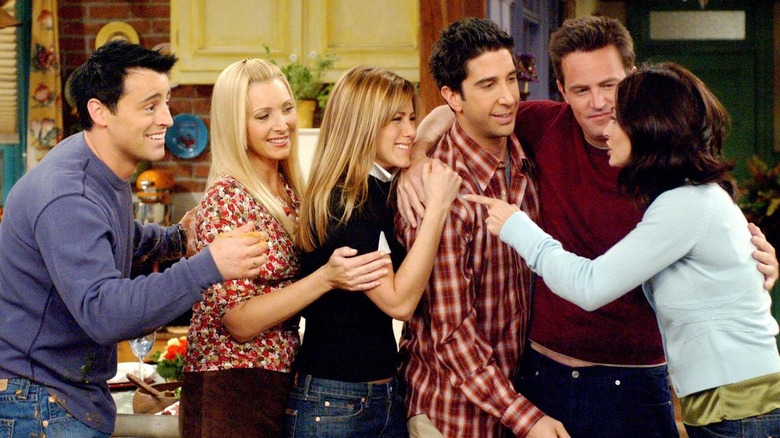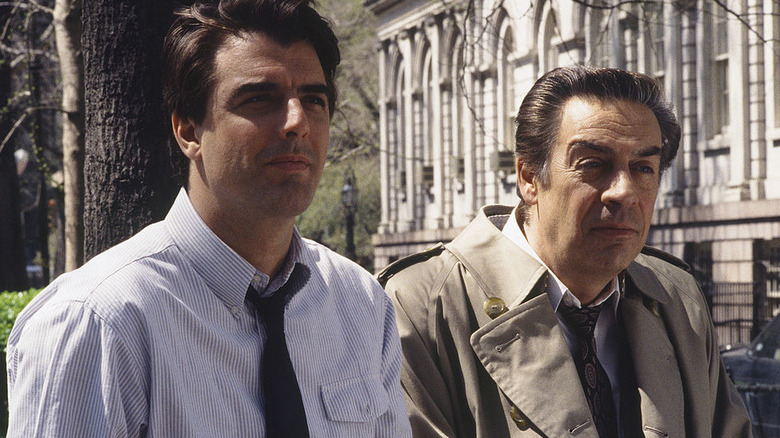'90s Shows That Became Unwatchable With Age
The 1990s were a great time to sit back and spend hours watching TV. Some of the best shows of the decade, like "Star Trek: The Next Generation," "My So-Called Life," and "Buffy the Vampire Slayer," are still beloved and well worth watching today. Even some of the biggest '90s TV flops, like "Freaks and Geeks" or "The Dana Carvey Show," have since found a second life and entirely new audience that truly loves them.
There are some true '90s gems that everyone should watch, but not everything that made it to air is still worth checking out. Some '90s TV was great for the time, but would slip right past an audience that has no context for life with dial-up internet and pay phones. Other shows were cherished at the time, but seem a lot less cute and fun from our perspective now. Back then, body shaming and homophobia were often used to fuel jokes that are just plain offensive and aren't worth a laugh today. It really was the best of times and the worst of times, but all the shows that should be left in the '90s deserve one final send-off, and we're here to give it to them.
Married... with Children
"Married... with Children" premiered in 1987 and ran for 11 seasons. The show followed the misadventures of the Bundy family, including Al (Ed O'Neill), his wife Peggy (Katey Sagal), and their children Kelly (Christina Applegate) and Bud (David Faustino). The Bundys are essentially the last family you'd ever want to be a part of. Al is a grumpy misogynist who hates his job as a shoe salesman. Peggy is a checked-out housewife who seems to resent her entire family. The kids are probably the most redeemable characters, but there's a reason you don't often see them spending their time with a big group of friends.
The fact that the Bundys are terrible is the whole point of "Married... with Children," and it actually makes the show a bit more watchable than other sitcoms of the time. That only takes the show so far, though. Almost everything that comes out of Al's mouth is homophobic, fatphobic, or misogynistic, and the show doesn't always frame that as being a problem. Sometimes we're supposed to be laughing at Al's views, but other times the show definitely seems to expect that we'll be laughing alongside its most problematic characters. Those moments are too frequent for comfort, which leaves "Married... with Children" as a show from which we should quietly seek a divorce.
Murphy Brown
Some shows have become unwatchable through no fault of their own. "Murphy Brown" is a phenomenal sitcom that won 18 Emmys during the decade it spent on the air. From 1988 to 1998, the show told the story of its titular character, played by Candice Bergen, working as a journalist and news anchor. The series had some insightful commentary on the news business of the time, and naturally, Murphy kept up with all the biggest real-world news stories of the day as well.
Unfortunately, what made "Murphy Brown" great is also what doomed it to inevitable unwatchability. Viewing the show today means missing out on a majority of the jokes and the overall context of everything that's happening in the story. Unless you were an avid viewer throughout the '90s, or you've really been studying your history, "Murphy Brown" just won't land with you.
The series was revived in 2018, with Bergen once again starring as Murphy. That season tackled the issues of the time, from "fake news" to the #MeToo movement, so it might hit a little closer to home than the original series. That said, even if you remember all the issues that "Murphy Brown" addressed in its revival, eventually they'll be outdated too.
Hercules: The Legendary Journeys
For the right audience, the Sam Raimi-produced series "Hercules: The Legendary Journeys" might still hold a bit of charm, but for most of us, it's worth skipping right over. Kevin Sorbo plays Hercules, who went on a series of mythological adventures, battling gods and monsters alike for six seasons from 1995 to 1999. The stories were action-packed and thrilling — or at least they seemed so at the time.
Two things are working against "Hercules" these days. The first is that the show's low production value really hasn't aged well. For the most part, "Hercules" is a monster-of-the-week style show, and you don't really need to keep up with every single episode to be able to sink into a new story. The action is the main appeal, but — there's no way around saying this — it looks terrible today. The fight choreography isn't engaging and the special effects, in retrospect, don't even look good for the time. Back then "Hercules" had less to compete with, but now it really can't hold up.
The second thing holding "Hercules" back is that it actually gave birth to its biggest competition. "Xena: Warrior Princess" and "Young Hercules" both started as spin-offs, but today they're undeniably more popular than the original "Hercules" series. "Xena" in particular holds up really well, so if you're in the mood for this kind of series, it's definitely the one you should choose to watch.
Transformers: Beast Wars
In some ways, animated kids' shows have an easier time staying relevant for decades than live-action TV series. Kids' shows tend to tell self-contained stories that don't rely so much on the context of the times, and animation often ages better than the special effects that other series might lean on.
But that isn't the case for "Transformers: Beast Wars," because it went all-in on CGI. The entire show is computer-generated, which was pretty cutting-edge at the time. Today it's liable to make your eyeballs bleed, particularly because the animal-shaped Maximals are the stars of this "Transformers" story. There's something about a bad CGI gorilla that will just haunt your dreams.
"Transformers: Beast Wars" played an important role in establishing the history of the Maximals, and decades of "Transformers" media has built on its foundations. That ends up working to the show's detriment because even if you could look past the bad CGI out of interest in the plot, the Maximals have had their story retold multiple times over. The "Transformers" comics told the story better, and "Transformers: Rise of the Beasts" shows off the Maximals in all their glory. The original animated series is really the last place you should turn to for more Maximals action.
Baywatch
It doesn't get much bigger than "Baywatch." The series ran for 11 seasons and more than 200 episodes between 1989 and 2001. By the mid-'90s the show had reached its peak, and more than a billion people were tuning in worldwide for each episode. Other shows could only dream of reaching those numbers, but if you put on an old episode of "Baywatch" today, you might be left scratching your head about the show's appeal.
The real story behind "Baywatch" isn't the straightforward tale of an unmitigated success. The actors went through hell filming on location, which often meant swimming around in filthy water for hours, and they didn't have any idea the show would become a hit. The production leaned heavily on montages of attractive extras to fill time, and the show got most of its mileage out of the combined star power of David Hasselhoff and Pamela Anderson, who both grew in fame during their years working on the series.
"Baywatch" was a real lightning-in-a-bottle moment that's never been able to be recreated. That's why multiple spin-offs like "Baywatch Down Under" and "Baywatch Nights" failed to catch on and the 2017 film was unable to reignite the same passion for the franchise that fans had back in the '90s. Watching "Baywatch" now probably won't ruin your nostalgia for the show, but it's unlikely to hook new fans. The show is just one of those things you had to be there for.
7th Heaven
Some of the shows on this list have glaring issues that will jump out at you within the first few minutes of any given episode. You're not likely to miss cringe-inducing special effects or blatantly misogynistic jokes. On the other hand, you might be able to get through an episode or two of "7th Heaven" without noticing anything wrong, although once you see it, you won't be able to unsee it.
"7th Heaven" is a family drama that follows the Camdens, a devout Protestant family living in California. Reverend Eric Camden (Stephen Collins) and his wife Annie (Catherine Hicks) keep themselves busy by raising their five children and getting involved in all kinds of local issues. From helping homeless teens to women being abused by their husbands, there's seemingly nothing that the Camdens, and Eric in particular, can't solve.
That's the real problem with the show. "7th Heaven" is insidiously misogynistic, and every new problem that the show introduces further solidifies the idea that every problem can be solved by a man who doesn't take no for an answer. Everyone in the family looks up and defers to Eric, who almost effortlessly deals with any issue thrown his way. Meanwhile, Eric's son Matt woos multiple women throughout the series, and almost every time they initially turn him down until he asks them out repeatedly, sometimes showing up at their houses unannounced. The whole vibe of the show is a bit troubling, and it pushes ideas about men and relationships that are really better left by the wayside.
Saved by the Bell
From 1989 to 1993, "Saved by the Bell" told the stories of a group of friends attending Bayside High School. For the most part, "Saved by the Bell" focused on typical teen drama — crushes, bullies, secret parties, and more. Those episodes alone might be hard to watch for today's teens. After all, more than a couple of the plots hinge on landlines and the characters spend a good deal of their free time hanging out at the mall.
It's when "Saved by the Bell" tries to talk about larger issues that the show's age becomes really apparent, and it stretches into definitely unwatchable territory. If you decide to brave a full rewatch, you'll hit one of these episodes almost immediately. "The Lisa Card" is the second episode of Season 1, and in it Zack (Mark-Paul Gosselaar) goes behind Lisa's (Lark Voorhies) back to sell boys at their school her stolen clothing and even a free pass to kiss her. The fact that the show plays this off as a joke and implies that Zack did nothing wrong because he ultimately gives her the money is really hard to swallow.
The show also doesn't deal with drugs in a way that's at all relatable today. Episodes like "No Hope With Dope" and "Jessie's Song" tell tone-deaf stories about drug addiction that have no connection with reality. In the latter, Jessie (Elizabeth Berkley) gets "addicted" to caffeine pills and has a meme-worthy freakout that remains the most watchable part of the entire series.
Frasier
"Frasier" was one of the 1990s' favorite sitcoms, but today the show might count as just selectively watchable for reasons that start with the show's very premise. Dr. Frasier Crane (Kelsey Grammer) works as a radio psychiatrist, helping anyone who calls into his show deal with various personal and emotional issues. Younger viewers might be able to relate if they just imagine Frasier as a podcaster with actual medical qualifications.
If Frasier's unrelatable job were the show's biggest issue, it'd still be pretty watchable. Unfortunately, the show's humor really doesn't land today, and some jokes are offensive enough that it's hard to imagine how they ended up on TV in the first place. The suggestion that either Frasier or his younger brother Niles (David Hyde Pierce) might be gay is constantly played for laughs. Niles has an obsession with Frasier's housekeeper Daphne (Jane Leeves) that's pretty uncomfortable to watch, and when the two of them, of course, finally get together, the show turns Daphne's sudden weight gain into a massive storyline. The show also delves into racist territory, with characters repeatedly doing racist accents as a bit.
There was a 2023 "Frasier" revival series that brought the character back and explored him trying to relate to his adult son. That show doesn't have the nostalgia factor going for it, but it does manage to sidestep many of the issues in the original. The '90s series may be tough to watch, but the revival might hold up a bit better down the line.
Home Improvement
In "Home Improvement," Tim Allen played Tim "The Toolman" Taylor, host of the show "Tool Time" and dedicated family man. Throughout the show, Tim and his wife Jill (Patricia Richardson) raise their children while dealing with all the issues you'd expect to see on a '90s family sitcom. From the plotlines to the jokes, "Home Improvement" is about as traditional as it gets, and that's really the problem.
The show repeatedly pushes family dynamics and strict gender roles that just don't fly today. All the men in the show are tool experts and beer enthusiasts who are utterly at a loss when it comes to housework and emotional sensitivity. All the women, who are often framed as a sort of opposing team to the men, are artistic, sensitive, and family-oriented. The show frames those two paths as the only real options for people, and whenever a character tries to break out of those roles, it causes problems for everyone around them.
Another part of "Home Improvement" that did not age well is the relationship between Tim and Jill. Tim doesn't do any of the real work in his home life, and everything from cooking to child rearing lands on Jill. When Jill decides to pursue a new degree and career in Season 4, Tim really pushes back on the idea, and the show definitely frames his opposition to her independence as something of a positive trait. He may be a concerned husband, yet he's anything but a role model.
Friends
There are two types of people: those who watched "Friends" back in the day, and those who missed it entirely. Whether you've gotten this far without watching the show because you never had any interest or because you were born too late to catch it in its prime, let us be the ones to tell you that you aren't missing much.
When you watch "Friends" today, a number of glaring issues quickly become apparent. Despite being set in New York City, the main characters are all able to afford spacious apartments while maintaining their free time, and the cast has all the diversity of a small town in Nebraska. Those logical consistencies are only the tip of the iceberg. The real problem with "Friends" is the way it presents so many of its jokes.
As with other '90s sitcoms, "Friends" is willing to jump right into tropes and offensive stereotypes that are particularly unpleasant to watch today. Fat jokes abound, and so do homophobic ones — the show goes out of its way to make fun of Chandler's (Matthew Perry) drag queen father. There are also some troubling relationships and issues with consent on full display. Ross (David Schwimmer) is meant to be a bit childish but ultimately charming, while he's actually whiny, jealous, and overall just toxic to be around. Some people are always going to love the show, but "Friends" is best left in the '90s.
Law and Order
"Law and Order" has dominated the TV landscape ever since launching in 1990. The series, set in New York City and following cops and detectives working grisly, disturbing cases week after week, has inspired numerous spin-offs during its 30-plus years on the air. The general view on "Law and Order" has shifted over the decades, but plenty of people still tune in to catch the latest case.
If you're interested in watching the gold standard of cop dramas, it's probably best to keep up with the current version of the show because some of the earlier episodes are absolutely unwatchable. "Law and Order" has frequently been prone to problematic presentations of characters and storylines, but those issues really shine through in the early seasons.
In Season 2, Episode 1, "Confession," Detective Mike Logan (Chris Noth) gets a suspect to confess by threatening him at gunpoint, an especially egregious example of justifying anything cops do on the job. Other times our supposed heroes seem to have problems relating to the victims. In Season 2's "Out of Control" — an episode, incidentally, where an African-American character named Fermi is played by a white woman – several officers talk dismissively about an assault victim. That's a trend that gets worse in Season 4's "Discord." The show also has an uneasy relationship with race, as exemplified by episodes like Season 6's "Trophy." There's really no issue that early "Law and Order" won't present in a troubling way, so it might be best to forget it entirely.
